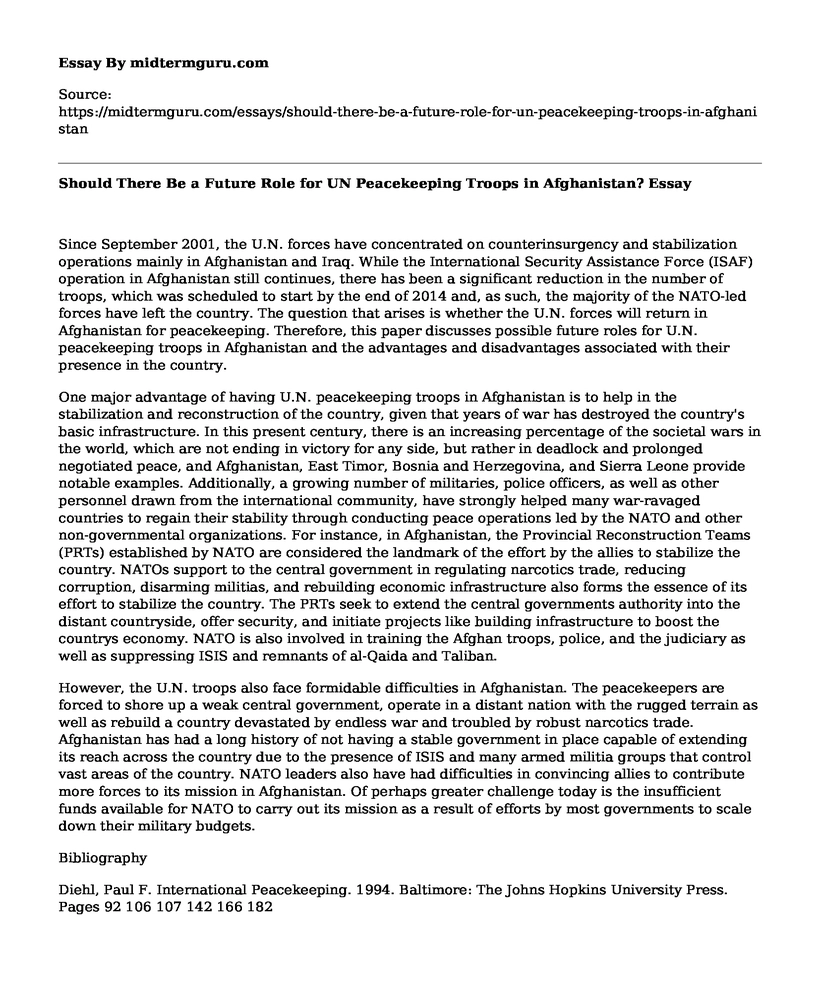Since September 2001, the U.N. forces have concentrated on counterinsurgency and stabilization operations mainly in Afghanistan and Iraq. While the International Security Assistance Force (ISAF) operation in Afghanistan still continues, there has been a significant reduction in the number of troops, which was scheduled to start by the end of 2014 and, as such, the majority of the NATO-led forces have left the country. The question that arises is whether the U.N. forces will return in Afghanistan for peacekeeping. Therefore, this paper discusses possible future roles for U.N. peacekeeping troops in Afghanistan and the advantages and disadvantages associated with their presence in the country.
One major advantage of having U.N. peacekeeping troops in Afghanistan is to help in the stabilization and reconstruction of the country, given that years of war has destroyed the country's basic infrastructure. In this present century, there is an increasing percentage of the societal wars in the world, which are not ending in victory for any side, but rather in deadlock and prolonged negotiated peace, and Afghanistan, East Timor, Bosnia and Herzegovina, and Sierra Leone provide notable examples. Additionally, a growing number of militaries, police officers, as well as other personnel drawn from the international community, have strongly helped many war-ravaged countries to regain their stability through conducting peace operations led by the NATO and other non-governmental organizations. For instance, in Afghanistan, the Provincial Reconstruction Teams (PRTs) established by NATO are considered the landmark of the effort by the allies to stabilize the country. NATOs support to the central government in regulating narcotics trade, reducing corruption, disarming militias, and rebuilding economic infrastructure also forms the essence of its effort to stabilize the country. The PRTs seek to extend the central governments authority into the distant countryside, offer security, and initiate projects like building infrastructure to boost the countrys economy. NATO is also involved in training the Afghan troops, police, and the judiciary as well as suppressing ISIS and remnants of al-Qaida and Taliban.
However, the U.N. troops also face formidable difficulties in Afghanistan. The peacekeepers are forced to shore up a weak central government, operate in a distant nation with the rugged terrain as well as rebuild a country devastated by endless war and troubled by robust narcotics trade. Afghanistan has had a long history of not having a stable government in place capable of extending its reach across the country due to the presence of ISIS and many armed militia groups that control vast areas of the country. NATO leaders also have had difficulties in convincing allies to contribute more forces to its mission in Afghanistan. Of perhaps greater challenge today is the insufficient funds available for NATO to carry out its mission as a result of efforts by most governments to scale down their military budgets.
Bibliography
Diehl, Paul F. International Peacekeeping. 1994. Baltimore: The Johns Hopkins University Press. Pages 92 106 107 142 166 182
Durch, William J. Twenty-first-century peace operations. Washington, DC: United States Institute of Peace and the Henry L. Stimson Center, 2006.
Gallis, Paul, and Vincent Morelli. "NATO in Afghanistan: A test of the transatlantic alliance." Library of Congress Washington DC Congressional Research Service, 2008.
Cite this page
Should There Be a Future Role for UN Peacekeeping Troops in Afghanistan?. (2021, Jun 01). Retrieved from https://midtermguru.com/essays/should-there-be-a-future-role-for-un-peacekeeping-troops-in-afghanistan
If you are the original author of this essay and no longer wish to have it published on the midtermguru.com website, please click below to request its removal:
- Kants Political Writings Essay: Categorical Imperative
- Analysis of Americas Conversation on Race Political Cartoon - Essay Sample
- Research Paper on Lubbock County Government
- Social-Psychological Dimension of International Conflict - Essay Sample
- Local Content Policies: Building Capacity for Positive Change - Essay Sample
- Idi Amin Dada's Domestic Policies in Uganda: 1971-1979 - Essay Sample
- Governments: Control Society, Maintain Law & Order, Grow Economy - Essay Sample







